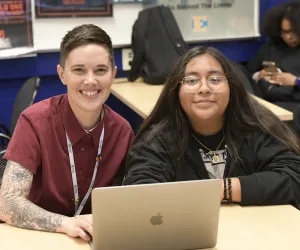Each year, Achieve Twin Cities provides personalized career and postsecondary planning guidance and resources for over 18,000 students through our career and college readiness (CCR) centers and services in 28 Minneapolis Public Schools (MPS) and Saint Paul Public Schools (SPPS) high schools.
This work with young people is informed and strengthened by regularly tracking data that indicates which students are engaging with our programs, the specific services they are utilizing and the milestones they are achieving in their postsecondary planning. We also meet regularly with our school counseling partners to analyze student outcomes, which helps us more effectively collaborate on school and district-wide strategies.
Data analysis is central to our work, because it helps us better reach those students who face the greatest barriers to postsecondary access and success and determine the specific support they need. It is also a key tool in our broader efforts to close persistent disparities in postsecondary plan applications.
We are glad to report significant growth in engagement with students in both MPS and SPPS districts in the 2022-23 school year. Here are some of the key take-aways from this analysis of our school-based programming:
Student engagement
We saw a marked increase in our engagement with students at our career and college readiness (CCR) centers in comprehensive schools (grades 9-12) compared to the previous year. Our staff engaged with 46% of all students at these schools, which was a 35% increase over the previous year, and met with 67% of seniors at these schools, a 22% increase. We were also delighted to see a 9% increase in our engagement with seniors of color and low-income seniors compared to the previous year.
CCR services accessed by students
A significant percentage of seniors visited our career and college readiness centers to access key support, with the most-used services including college searches, college application support, FAFSA/Dream Act completion, career exploration, CCR curriculum support, and scholarship searches and application support. In MPS, 55% of seniors said that an Achieve CCR coordinator had helped them develop their postsecondary plan.
Student postsecondary plans, FAFSA completion and college applications
93% of seniors at our comprehensive high schools graduated with a postsecondary plan, which included college, apprenticeships, certificate programs, workforce, military or structured gap year programs. 83% of seniors submitted an application for a postsecondary plan, and 77% of seniors reported feeling confident in their postsecondary plan.
Looking at FAFSA completion, 75% of college-going seniors at these schools submitted their FAFSA, a 5.6% increase over the previous year. We were happy to see even greater increases in FAFSA completion for college-going students of color (9% increase) and low-income students (11% increase) compared to the previous year.
There was a a slight decrease (3%) in the number of seniors applying for college, primarily among students of color and low-income students. This is not surprising, given variability in national trends in college enrollment post-COVID, as well as long-standing race and income gaps in college access. To address these disparities, our school-based teams are continuing to focus on engagement with students of color and low-income students and implementing additional strategies to identify and target support to students who need it earlier in the school year.
School partner feedback
We were very pleased to see nearly universally positive responses from our MPS and SPPS school partners about the quality of our staff and services. Our team is working this year to improve our systems of sharing student data with school partners for even more effective alignment of our efforts.
Key priorities for our future work
We are excited about this growth in student engagement, and are developing and implementing several key priorities to continue this trend moving forward, including:
- Strengthening outreach to college-intending students for FAFSA completion, particularly BIPOC and lower-income students, to increase rates for these students.
- Collecting senior postsecondary plan data earlier in the year so our team can segment support and outreach sooner.
- Likewise, identifying students who have less confidence in their postsecondary plans at the start of the year so we can target students that need the most support more quickly.
- Developing additional specific strategies for reaching student target groups.
